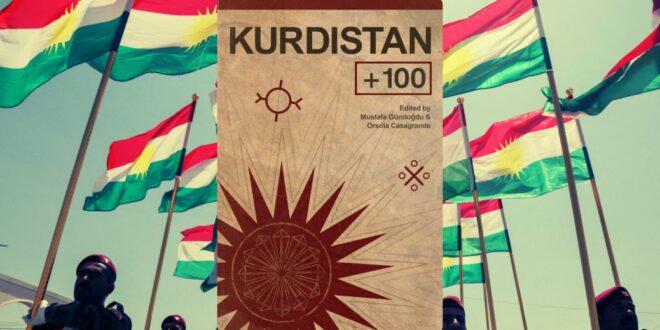Book Club: Kurdistan+100 reimagines Kurdish state struggles through a prism of futurism, offering a space for freer Kurdish expressions and possibilities.
Being Kurdish outside of Kurdish society is hard. From complete ignorance in the West to being viewed as a proxy militia in SWANA, from hearing the linguicide of the Kurdish language in Iran to seeing cultural and political repression in Turkey — to be Kurdish is to be steeped in pain and ostracisation.
Being Kurdish is a political existence that never lets up on the weight that we carry. But like the sun that emblazons our flag, we shine with dignity as we face a world that constantly tries to erase us.
The Kurdish spirit and yearning for self-independence and autonomy cannot be extinguished, and this spirit is displaced beautifully in the anthology Kurdistan+100: Stories from a Future Republic, published by Comma Press and edited by Orsola Casagrande & Mustafa Gündoğdu.
"To read an anthology of Kurdish stories in the English language makes this an immediate treasure" Kurdistan+100: Stories from a Future Republic takes place in 2046, exactly 100 years from the short-lived Republic of Mahabad, the only independent Kurdish state in modern history.
Despite its swift quashing from the Shah of Iran, Mahabad still represents the hope that we Kurds may live to see genuine freedom in our lifetimes.
Mahabad’s memory animates many of the stories presented in the anthology as the various characters reflect on the history that brought them to the cusp of freedom.
Kurdish independence is an intersectional struggle
In Jîl Şwanî’s story, The Wishing Star, one of the characters is named Mahabad, reflecting a Kurdish tradition of naming our children after beloved cities and towns.
And while the stories cover a range of the Kurdish experience in the future republic, Şwanî’s The Wishing Star stands out for showing the brutality of Turkish oppression of Kurds.
Through the lens of an outsider guided by his Kurdish friend, curiously named Daniel, we see the beauty of the mountains and the generosity of Kurdish villagers, only for ruthless attacks of Turkish soldiers to follow.
Şwanî’s magnificent prose presents a vivid picture which shows that, even as Kurds continue to push for independence and autonomy, our oppressors will continue all their means to subdue us as well. It’s a grim understanding that we Kurds know all too well as we struggle for freedom.
Whilst the title Stories from a Future Republic might imply a rosy read, the anthology, whilst sincere in its optimism, only does so to underline the importance of struggle to get there. The Kurdish people have been oppressed for centuries, and we know those in power will not give up easily.
Meral Şimşek’s Arzela’s story conveys this understanding perfectly. Switching between 2020 and 2046, Şimşek’s protagonist lives between the 2020 Kurdish revolution and the intra-political struggles of a liberated Kurdistan in 2046.
Arzela knows that nothing worth gaining isn’t well fought for. With striking prose, Şimşek offers hope to Kurds — and other oppressed groups — on the path to freedom.
"The +100 series offers a fascinating overview of our various peoples’ histories and organising for freedom, and I would love to read similar anthologies about Armenians, Druze, Assyrians, or other oppressed minorities in the SWANA region" There is a keen understanding throughout the stories that the struggles of Kurds are tied to others worldwide and the global issues that affect us.
Cleaners of the World by Hüseyin Karabey’s protagonist Jiyan, a Yazidi refugee from Shingal and a survivor of ISIS’s genocide, meets and works with a certain famous young Swedish climate activist.
Kearbey’s story is an intriguing exploration of the potential ties between man-made climate change and ISIS’s assault. Given that climate change increases and strengthens armed conflict worldwide, it’s not a stretch to think that it could have emboldened ISIS’s assault on Shingal.
It’s certainly a striking and potentially unorthodox means of adding more context to the Yazidi genocide, but it ultimately helps globalise the Kurdish and Yazidi struggles, hopefully engendering more support through this line of fiction.
From My Name is Palestine to These Olive Trees, here are 10 books on Palestine to read to your children 📚 https://t.co/vJC4oU8TrJ — The New Arab (@The_NewArab) March 14, 2024To read an anthology of Kurdish stories in the English language makes this an immediate treasure. To read about Kurdish hospitality, clothing, food and tea, dances, mountains, and wildlife is amazing.
While Western media starves most SWANA peoples of recognition and representation, the Kurds are often at the bottom of the list.
I’ve felt invisible in almost all media I’ve consumed, but Kurdistan+100: Stories from a Future Republic is a magnificent step forward that I hope others soon follow.
From Assyria to Armenia, the potential of the +100 series burns bright
There’s so much more I can say about the awe-inspiring, heartbreaking, and galvanising stories of Kurdistan+100: Stories from a Future Republic, but I would not want to spoil the tales in its binders.
I implore everyone to read this unique presentation of Kurdish identity and struggle, and I’m excited to read Comma Press’s anthologies on Palestine — set one hundred years after the Nakba, and on Iraq — set one hundred years after the American invasion of 2003.
The +100 series offers a fascinating overview of our various peoples’ histories and organising for freedom, and I would love to read similar anthologies about Armenians, Druze, Assyrians, or other oppressed minorities in the SWANA region.
With this magnificent anthology of stories from my people, it’s clear that they have struck gold with this unique form of storytelling, and I’m excited to read the other stories they’ll tell from here.
 Eurasia Press & News
Eurasia Press & News




